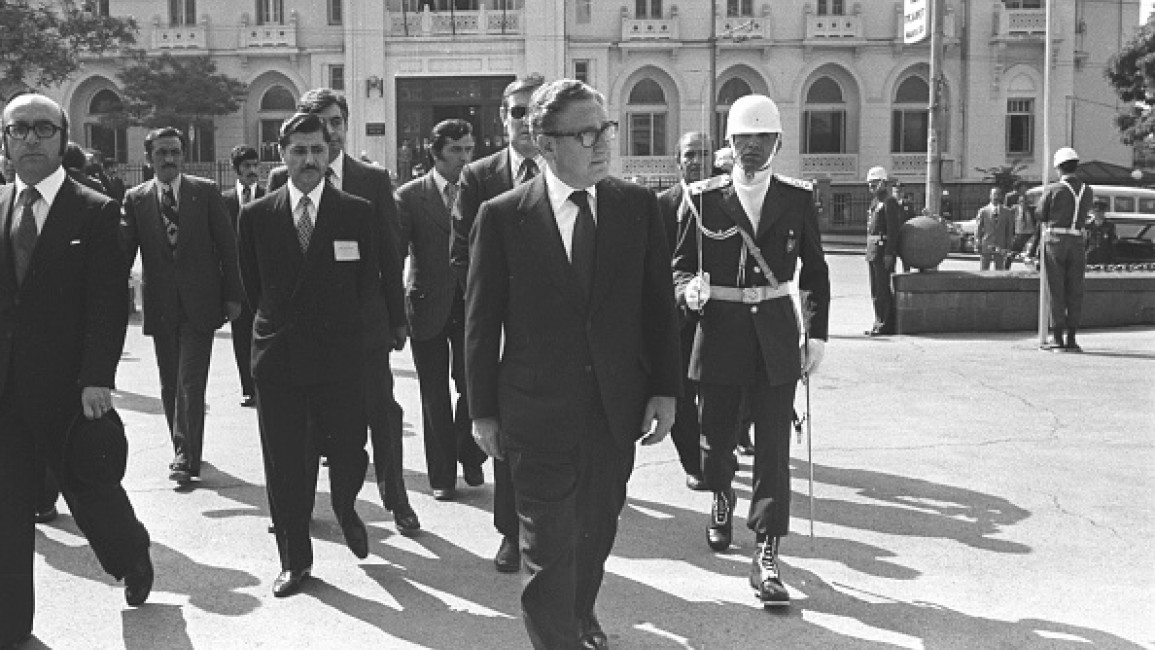Who was Henry Kissinger and why was he hated in the Arab world?
Henry Kissinger, a divisive and polarising US diplomat whose promotion of US hegemony shaped the post-World War II world, died on Wednesday, his consulting firm said. He was 100.
Kissinger, often criticised for a murderous legacy in US foreign policy, died at his home in Connecticut, which he had built through the wealth he made during and after his government career.
Born to a German Jewish family in Furth, Bavaria, in 1923, Kissinger had fled Nazi Germany with his family to New York in 1938. At age 20, he became a US citizen and served in the Army's intelligence division until the end of the Second World War.
Kissinger attended Harvard University, graduating with a PhD in 1954. While studying, he worked for the US government's Psychological Strategy Board - a unit established by the White House in 1951 to push for the support of the US and "democracy" against communism.
Kissinger was deemed a controversial figure in the Arab world for his role in shaping US foreign policy, particularly towards the Middle East. For many, his actions fuelled instability, favoured strategic interests over moral principles and left a legacy of geopolitical manoeuvring at the expense of justice and human rights.
Shaping US support for Israel
Kissinger played an instrumental role in strengthening ties between the US and Israel, forcing the US foreign policy into a shift in favour of the Zionist state.
The US became a major ally for Israel when he served under the administrations of Richard Nixon and Gerald Ford.
During the 1973 Arab-Israeli war, which killed over 20,000 Arabs and around 2,500 Israelis, Kissinger saw that Israel was armed to the brim to prevent "an Arab victory".
His war-mongering appetite saw the US provide emergency military aid to Israel during the war reversing early victors by the Egyptian and Syrian armies.
Kissinger had pushed for a US policy that "would protect all its interests in the Middle East" of which "the survival and wellbeing of Israel" was the only one.
Kissinger also ensured that the US did not establish relations with the Palestinian Liberation Organisation - then headed by Yasser Arafat.
Isolating Palestinians
Kissinger sought to isolate the Palestinians in favour of Israel. In 1975, he signed a "memorandum of understanding" with the Israelis that ensured America would not recognise or hold talks with the PLO unless the Palestinian movement recognised Israel's "right to exist".
His role in the controversial Camp David Accords, signed in 1978 also saw him sideline the Palestinians. The agreement was signed between then-Egyptian President Anwar Sadat and then-Israeli Prime Minister Menachem Begin, leading to Egypt becoming the first Arab country to officially recognise Israel.
A major criticism of the Camp David Accords was the absence of direct Palestinian involvement in the negotiations. The Israeli occupation and the issue of Palestinian self-determination were not addressed in the agreement. Many saw the accord as a form of "selling out" Palestinian national aspirations for statehood.
US foreign policy, in 1975 as now, sought to enhance Israel's strategic capacity in the region, consolidate friendly Arab regimes, and isolate and debilitate the Palestinian cause.
Relations with authoritarian regimes
During his tenure as Secretary of State, Kissinger engaged with various authoritarian regimes in the Middle East as part of a realpolitik approach to advance US strategic interests.
Kissinger had a close relationship with the Shah of Iran, Mohammad Reza Shah Pahlavi, during the 1970s. The US supported his autocratic rule, which restricted civil liberties and brutally suppressed political opposition, and saw the Shah as a key ally in the region and a stabilising force against Soviet influence.
Kissinger also played an instrumental role in fostering US-Saudi relations. Similarly, in a bid to counter Soviet influence and ensure uninterrupted US access to oil, he forged strong relations with the Saudi regime in the 1970s, turning a blind eye to human rights abuses and political repression in the kingdom. This relation also resulted in an increase in US arms sales to the Saudi regime, further empowering its authoritarian rule.
Kissinger also engaged with Syrian President Hafez al-Assad to limit Soviet influence and secure US interests, despite the Syrian regime's poor human rights records. He viewed Syria, under Assad, as a potential ally against radical and leftist movements in the region, with the secular Baathist regime aligning with US interests in preventing the rise of anti-American and Soviet-backed movements.
Kissinger's influence on Middle East policy left a lasting impact which many Arab nations continue to reel from today.



